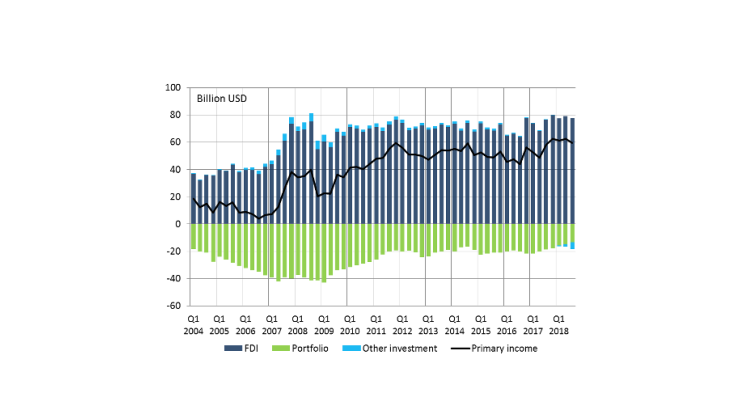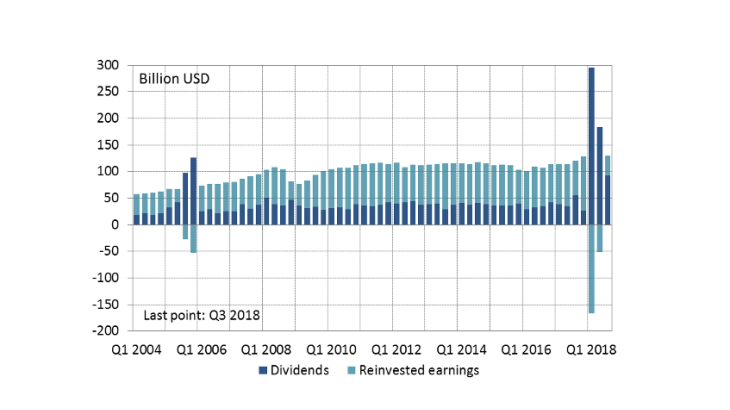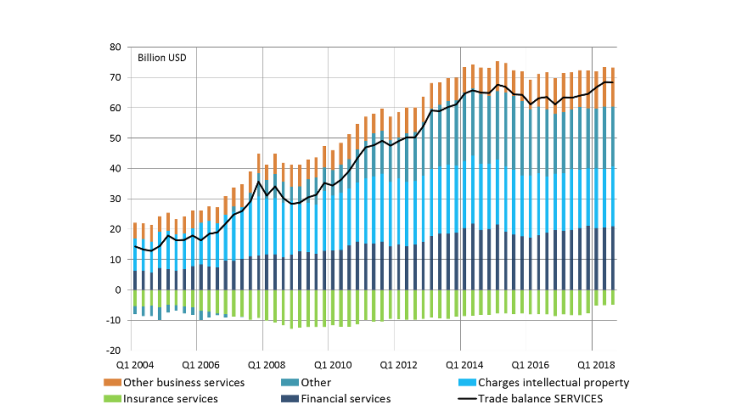- Home
- Publications et statistiques
- Publications
- Does the Trump corporate tax reform impa...
Does the Trump corporate tax reform impact the composition of the US current account?
Post n°109. Le US Tax Cuts and Jobs Act mis en œuvre en 2018 a un impact sur l’activité aussi bien nationale qu’internationale des sociétés américaines. Néanmoins, la réduction de l’impôt sur les sociétés n’a eu qu’un effet transitoire sur la composition des revenus des investissements directs étrangers des États-Unis, sans entraîner jusqu’à présent d’amélioration significative du solde commercial.

The Tax Cuts and Jobs Act recently adopted in the United States has three main components: (i) the cut in the standard corporate tax rate from 35% to 21% – in line with the OECD average; (ii) the shift from a worldwide corporate tax system to a territorial tax system, taxing companies only on domestic income; and (iii) a one-time tax on the deemed repatriation of accumulated income held offshore. This reduced rate is 15.5% for offshore funds held in cash or liquid assets, and 8% for the remainder, payable over a period of 8 years.
The new law was therefore expected to encourage US multinational corporations to report their profits in the United States instead of reporting them in low tax jurisdictions. If this were to happen, the effects of the law should induce an increase in the balance of goods and services and a decrease in the primary income balance. Additionally, the new law should also encourage US multinationals to repatriate foreign earnings to the United States instead of keeping them offshore.
Profit hoarding and profit shifting before the corporate tax reform
Prior to the reform, the United States taxed the worldwide income of US multinationals, with a non-refundable credit for foreign taxes paid. However, multinationals could keep their accumulated earnings abroad indefinitely, as they were subject to US tax only when they repatriated these earnings. This tax system created incentives for multinationals to minimise their tax bill through two channels:
- Profit hoarding, leading to substantial stocks of non-repatriated earnings, estimated at about USD 2.5 trillion at the end of 2017 by the Institute of Taxation and Economic Policy, with more than USD 1 trillion held in cash. For example, Apple Inc. accumulated USD 252 billion in cash held offshore by the end of 2017, corresponding to 94% of its total cash earnings.
- Profit shifting, corresponding to profits being under-reported in the United States and transferred onto the books of affiliates in low-tax countries. Profit shifting occurs mainly through transfer pricing, often on intellectual property rights (patents, trademarks, etc.). Indeed, six small jurisdictions (Bermuda, Ireland, Luxembourg, the Netherlands, Singapore and Switzerland), which count for less than 1% of the world’s population, hold 63% of the overall profits earned abroad by US multinationals (Zucman, 2018).
This led to a specific US current account structure, both in the income account and the trade balance. Despite the United States being a net debtor country, its primary income balance is positive and has become larger over the past fifteen years (Chart 1). This reflects an excess return on foreign assets held by the United States vis-à-vis its liabilities, a fact that has often been dubbed “the exorbitant privilege”. In fact, the return earned by US residents on their foreign assets is higher than the one paid for their liabilities to non-residents. This excess return is partly explained by US multinationals over-reporting their profits offshore (Guvenen et al. (2017).
Additionally, due to the higher corporate tax rate in the United States, US multinationals had incentives to understate net exports of services for intra-group transactions, thus artificially lowering the trade balance. While this can also be performed by manufacturers (exporting components at artificially low prices and re-importing them at higher prices), this strategy is essentially used in high-tech and pharmaceutical sectors. Multinationals owning a considerable amount of intangible assets often transfer them to their subsidiaries in low tax jurisdictions, pay royalties for the use of intellectual property rights, and thus minimise profit in the United States.
The transitory impact of the US corporate tax reform on profit repatriation
Beyond the corporate tax cut, the new law moved the system toward a territorial system, excluding the business income earned and taxed abroad from US taxation. As a transition measure associated with the shift to the territorial system, the law imposes a one-time tax on the deemed repatriation of accumulated income held offshore. This rate is 15.5% for offshore funds held in cash or liquid assets, and 8% for the remainder, payable over a period of 8 years. These reforms have an impact on the overseas profits of US multinationals, which are booked as foreign direct investment income in the primary income of the balance of payments. These profits are reported either as dividends (when they are sent back to the United States) or as reinvested earnings (when they are kept abroad).

Chart 2 shows that US companies responded to the tax reform by increasing the amount of dividends (a positive income receipt) while decreasing the outstanding amount of past earnings reinvested in their foreign affiliates (resulting in negative “reinvested earnings”). Two remarks can be made:
- The corporate tax reform does not change the overall income receipts of US foreign direct investment, as the increase in dividends is completely offset by the negative reinvested earnings.
- Despite the permanent cut of the standard corporate tax rate from 35% to 21%, the adjustment of repatriated dividends and reinvested earnings appears limited to the first and second quarters of 2018. Indeed, dividends decrease substantially in quarter three, whereas reinvested earnings return to positive as they were before the tax reform.
The response of US companies to the corporate tax reform mainly consisted in the partial repatriation of previously accumulated stocks of earnings (around 20% of the total) due to the temporary lower tax. This firms’ behaviour is similar to the one observed in 2005 when another law granted US multinationals a one year tax holiday to repatriate foreign profits at a 5.25% tax rate.
Profit shifting is not affected by the US corporate tax reform
In order to have a long-lasting effect on the trade balance, the corporate tax reform should modify the way US multinationals book their transactions. The corporate tax cut should indeed reduce the profit shifting decisions of US multinational firms, decreasing foreign direct investment receipts and raising the amount of net exports in services.

As shown in Chart 2, we observe a change in the composition of foreign direct investment income, but the balance remains stable at its pre-reform level. Moreover, this is not associated with an increase in net exports of services. In particular, the decomposition of the services trade balance in Chart 3 shows that there has not been any increase in intellectual property charges, for which profit shifting is more relevant. At the moment, it is too soon to assess the full impact of the reform as US multinationals may take time to adjust the location of their assets and activities. However, the profit shifting decisions of multinational firms do not seem to be affected so far. Indeed, the US corporate rate is still larger than many advanced countries and tax havens (21% compared to 12.5% for Ireland for example, or even 0% for several tax havens).
Updated on the 25th of July 2024